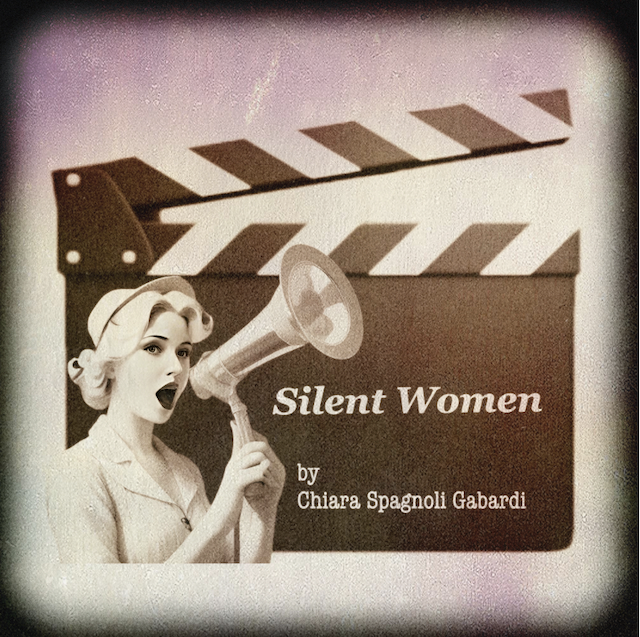
Our writer Chiara Spagnoli Gabardi has finished a new project that we want our readers to check, she is the author of “Silent Women”…
SILENT WOMEN A Collection of Poems in Terza Rima, that gives a voice to 21 female filmmakers of the silent era, is now a Podcast! For many decades women cinéastes were swept into oblivion. At long last their visual artistry has been brought back to the light, but what would happen if some of their tattered audio recordings were found?
What would each one tell us about her life and work? The intent of this collection of poems is to give a voice to some female filmmakers of the silent era, 21 like our current century, and to trigger in listeners the desire to find more about them. Each terza rima poem is introduced with music by a female composer of the same country of the filmmaker, who might have listened to her while at work.
Written and recited by Chiara Spagnoli Gabardi
Sound editing by Massimo Privitera (Musicologist and Founding Director of Colonne Sonore magazine)
Spreaker: https://www.spreaker.com/podcast/silent-women–6070283
Spotify: https://open.spotify.com/show/2LLgSOwkvk1GdUgbHVkewB
Podcast Addict: https://podcastaddict.com/podcast/silent-women/4837344
Podchaser: https://www.podchaser.com/podcasts/silent-women-5605856
iHeartRadio!: https://www.iheart.com/podcast/53-silent-women-146000411/
Deezer: https://www.deezer.com/it/show/1000622972
JioSaavn!: https://www.jiosaavn.com/shows/Silent-Women/1/iLl,6dykpZA_
Amazon Music/Audible!: https://music.amazon.com/podcasts/6086199d-df27-4a7d-bbc0-ab71830d722d/Silent-women
Poetry allows to harness the power of storytelling blending the use of narrative, rhythm, allegories, imageries and emotions. My turning point writing in verse was when I wrote ‘St. Dwynwen’s Hiraeth.’ I used terza rima and the first person to evoke the story of the Welsh patron saint of lovers, and my recording of the poem was played throughout the woodlands of Aberlleiniog.
As someone whose profession and passion revolves around cinema, retracing the craft and challenges of female filmmakers of the silent era occurred spontaneously. With the collection of poems ‘Silent Women’ I tried to cover all continents, through an emblematic number of female directors. When I decided to transform these writings in a podcast I had the desire to shine further light on women’s talents of that time, and I came up with the idea of pairing each soliloquy with music by a female composer of the same epoch and country of the filmmaker.
The intent was to convey the atmosphere of the period, enhancing the auditory perception. For this, I’m exceptionally grateful to Massimo Privitera, who sprinkled sounds that evoked the narration and gave a vintage effect to each stream of consciousness, almost as if a derelict recording of each Silent Woman had been unearthed from a pile of old boxes and finally shared with the world. Chiara Spagnoli Gabardi
List of Episodes:
1. Alice Guy Blaché, with music by Cécile Chaminade (France/USA)
2. Lois Weber, with music by Amy Beach (USA)
3. Tressie Souders, with music by Florence Price (USA)
4. Jessica Borthwick, with music by Alice Mary Smith (UK)
5. Elvira Notari, with music by Emilia Gubitosi (Italy)
6. Luise Kolm-Fleck, with music by Johanna Müller-Hermann (Austria)
7. Lotte Reiniger, with music by Clara Schumann (Germany)
8. Germaine Dulac, with music by Louise Farrenc (France)
9. Adrienne Solser, with music by Henriëtte Bosmans (Netherlands)
10. Olga Preobrazhenskaya, with music by Nina Makarova (Russia)
11. Nina Niovilla, with music by Maria Szymanowska (Poland)
12. Ebba Lindkvist, with music by Elfrida Andrée (Sweden)
13. Helena Cortesina, with music by Rosa García Ascot (Spain)
14. Mimí Derba, with music by María Grever (Mexico)
15. Gabriela von Bussenius Vega, with music by Carmela Mackenna (Chile)
16. Cleo de Verberena, with music by Chiquinha Gonzaga (Brazil)
17. Paulette McDonagh, with music by Mirrie Hill (Australia)
18. Aziza Amir, with music by Umm Kulthum (Egypt)
19. Fatma Begum, with music by Jaddanbai Hussain (India)
20. Xie Caizhen, with music by Xiao Shuxian (China)
21. Tazuko Sakane, with music by Nobu Kōda (Japan)

